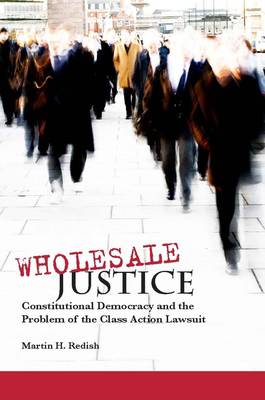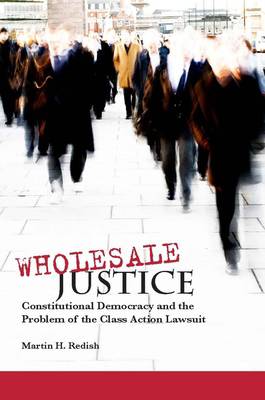
- Afhalen na 1 uur in een winkel met voorraad
- Gratis thuislevering in België vanaf € 30
- Ruim aanbod met 7 miljoen producten
- Afhalen na 1 uur in een winkel met voorraad
- Gratis thuislevering in België vanaf € 30
- Ruim aanbod met 7 miljoen producten
Zoeken
Wholesale Justice
Constitutional Democracy and the Problem of the Class Action Lawsuit
Martin H Redish
Hardcover | Engels
€ 225,95
+ 451 punten
Uitvoering
Omschrijving
In recent years, much political and legal debate has centered on the class action lawsuit. Many lawyers and judges have noted the intense pressure to settle caused by the very filing of a suit. Some contend that the procedure amounts to a form of judicial blackmail. Others counter that it is an effective means of policing corporate behavior and assuring injured victims' fair compensation. This book represents the first scholarly effort to view the modern class action comprehensively through the lenses of American political and constitutional theory. Redish argues that the modern class action undermines foundational constitutional principles, including procedural due process and separation of powers, and has been improperly transformed from its origins as a complex procedural device into a means for altering controlling substantive law in highly undemocratic ways. Redish proposes an alternative vision of the class action lawsuit, one that is designed to enable the device to serve its valuable procedural purposes without simultaneously contravening core precepts of American constitutional democracy.
Specificaties
Betrokkenen
- Auteur(s):
- Uitgeverij:
Inhoud
- Aantal bladzijden:
- 328
- Taal:
- Engels
Eigenschappen
- Productcode (EAN):
- 9780804752749
- Verschijningsdatum:
- 20/04/2009
- Uitvoering:
- Hardcover
- Formaat:
- Genaaid
- Afmetingen:
- 157 mm x 229 mm
- Gewicht:
- 544 g

Alleen bij Standaard Boekhandel
+ 451 punten op je klantenkaart van Standaard Boekhandel
Beoordelingen
We publiceren alleen reviews die voldoen aan de voorwaarden voor reviews. Bekijk onze voorwaarden voor reviews.







